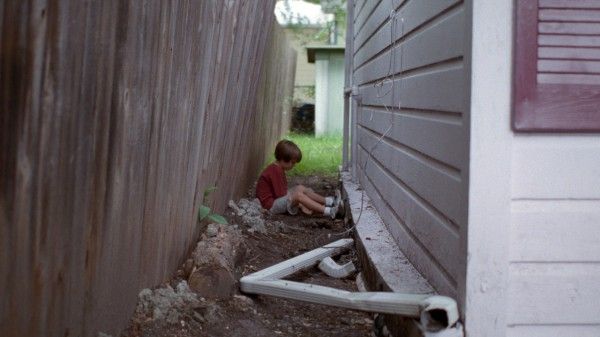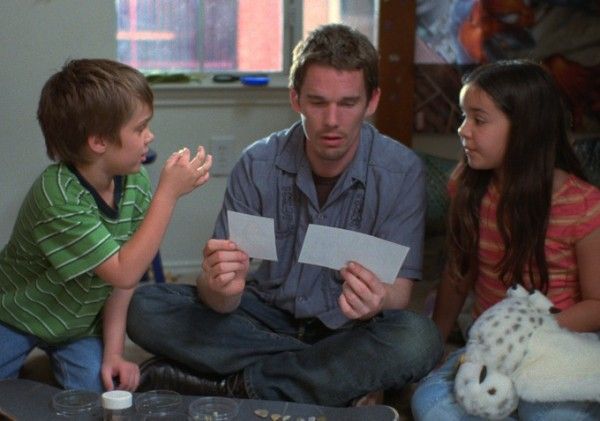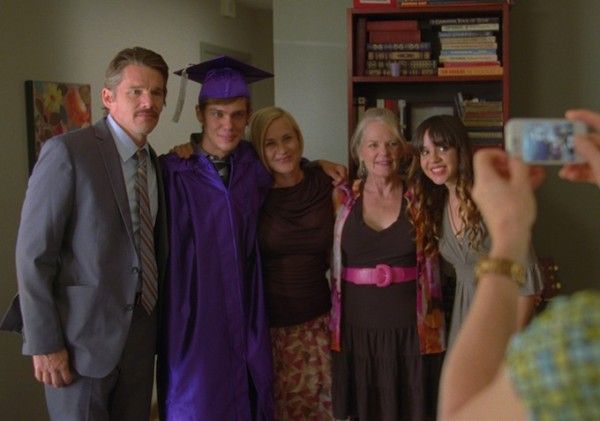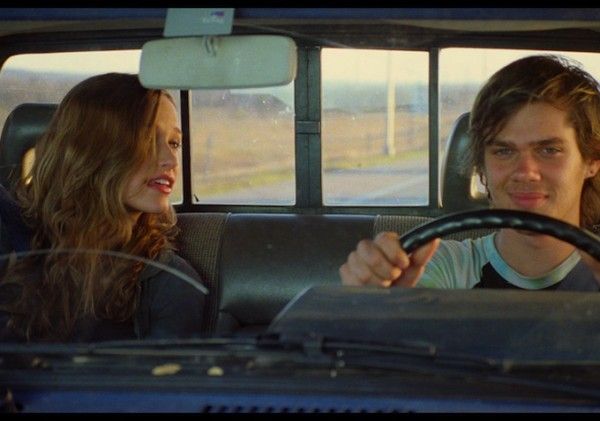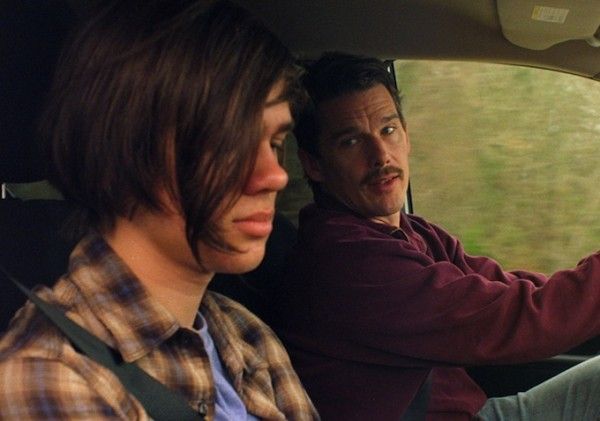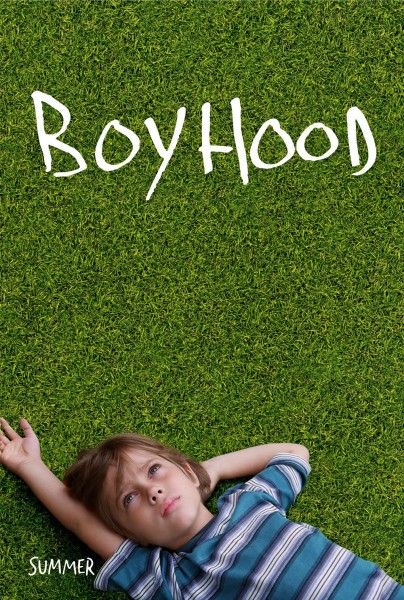From writer/director Richard Linklater, the indie drama Boyhood is a very unique and special project, in that it was filmed over 12 years with the same cast. As you watch Mason (Ellar Coltrane) grow up, from age 6 to age 18, you will see him navigate all aspects of adolescence from road trips and family dinners to birthdays and graduations, and all of the moments in between. The film also stars Ethan Hawke and Patricia Arquette, as Mason’s parents, and Lorelei Linklater, as his sister Samantha.
During a conference at the film’s press day, filmmaker Richard Linklater and actor Ethan Hawke talked about taking on such an ambitious project, how they kept in contact when they weren’t filming, deciding which pop culture trends to include, deciding on the music, how much was scripted vs. improvised, the approach to the editing process, whether there’s a lot of deleted footage, and if he would ever consider using this process again. Check out what they had to say after the jump.
Question: Was there any worry about taking on such an ambitious project?
RICHARD LINKLATER: Yeah, I was worried about that, particularly in the early years. Our biggest gap was between one and two, which was just sheer scheduling and business. The end was so far away that it was abstract. It got easy in the second half because it was like, “We’re halfway there!” You could see it a little more.
ETHAN HAWKE: It gained momentum, the more we were in it. Knowing Rick, I didn’t have any fear that we wouldn’t finish it. It could have become more problematic. Jonathan Sehring at IFC really believed in this project and was there supporting, but he could have gotten fired. That happens to these executives. IFC could have gone under. Most independent film companies do go under. If that happened, we would have had to hustle in other ways. But the fact that Jonathan kept his job, he kept hiding a little bit of money, every year, for us.
LINKLATER: He had to jump through hoops, at a corporate level. People were like, “We don’t get our money back ‘til when?!” It was a huge leap.
HAWKE: We got so lucky. Mostly the biggest luck of all, in a lot of ways, was Lorelei [Linklater] and Ellar. We never could have predicted that they would contribute on the level that they both did.
What happened with everybody when you were not filming? Did you keep in contact with the children, so there would be a close family tie? And when you did film each year, how did you get back together?
LINKLATER: We’d end each year and talk about what I felt was coming the next year, a little bit. Given everyone’s schedules and busy-ness, this was everyone’s side project, my own included. I was doing a lot of other films in these 12 years, and everybody was busy, but we would always talk about it. It was always on a burner. It was something to think about. Ellar [Coltrane] and I would often get together and talk about next year, a bit. And Ethan [Hawke] and I would talk on the phone. But it would get real intense, once it was around the time that we would shoot.
HAWKE: I went to go visit Ellar. His father is a musician and Ellar was a roadie, so I went to go visit him. I remember saying, “There’s something moving about this soundcheck.” I think that started the idea of visiting my character, as a possible finale. It’s how ideas turn into other ideas. The father in our narrative was really giving up on being a musician, but there’s always something so touching about a soundcheck for the performance to come.
LINKLATER: This movie was just a life project for all of us. We were committed for all of these years, and you could just have your antenna out. That’s a good way to go through life. It would be like, “Oh, that could feed into this,” or “That happened to a friend of mine,” or “This memory that I hadn’t had in all these years just came to me, about something from my own childhood.” It was all in play, for all those years. That’s what made it the fun life project it turned out to be.
There were moments in the film where it could have gone to a dark place, but didn’t. What made you decide to do that?
LINKLATER: It tells you how conditioned we are. We don’t make films about the ordinary. Why watch a film that reflects real life? I want to watch something that has a car wreck. Why make art about normality? We’re really conditioned, in films particularly, to have the big moments. It’s fun to see audiences, even so far into this movie, when they know the vibe of the movie, you can just feel it. I never anticipated that. It was never in my conception. It never crossed my mind that anything bad would happen. But, it shows you how conditioned we are. Most of that stuff doesn’t happen. Most of us do survive childhood. So, everything about this movie fits into the statistical norms. You do survive. You do get through it. There are all these little bumps and bruises along the way, but it was never about the big stuff. We don’t show a lot of that stuff because it was really more the things you remember from your life. It’s not the big moments. They’re not the best.
How did you decide which pop culture trends to include?
LINKLATER: That was part of the fun of this. Having your antenna out there, not only were you collaborating with incrementally aging and growing up actors, but the culture of what is going on in the world. When we started this movie, the Iraq war had not started. Every year, you had some choices to make about what you wanted to represent in the movie and what that might be remembered. We were making a period film, but in the present, which is an odd thing to do.
HAWKE: Will people remember that Sarah Palin’s daughter was pregnant? Is that registering in the national consciousness in such a way that it will be something that you will remember, or is it the kind of thing that you won’t remember?
LINKLATER: It was not what I wanted the movie to be about. It was never the lead story. We could just incorporate those things. The Harry Potter book thing was more of an effort because those scenes really are so much about that. But, that was a phenomenon that I thought you would remember, if you look back at your life.
HAWKE: It was just so fun to tell a real story about a real family. So much of the problem with most movies is that they create a false narrative, so that it has a beginning, middle and end that all takes place over six months. But, our lives never feel like that. We have moments of grace, or moments when we feel something deeply, but it is because of 90 million other things that happen before it, and not just that moment. I found it so enjoyable to tell a story without any lies in it. Time is so much a part of what makes you close to people. Time is what creates trust. We got to do that with each other, and we go to do that with the audience. The audience starts to believe these characters because they are watching them experience time with each other.
Richard, how did you choose the specific music?
LINKLATER: Music is really powerful and puts you in a place in time. I waited until the end to put all the music in the movie, to see how time was treating a lot of different music. There are a lot of different things in the movie, serving a lot of different purposes, like the tastes of the characters that were listening to it, at a given time. I wanted it to reflect the culture as you perceive it, as a kid. It’s not your music. Maybe it’s your older sibling’s music. Maybe it’s coming out of the car radio from friends. It’s music that’s in the culture, but not really yours. And then, there’s your music, as you mature and get your own taste. It runs the gamut there. We were really lucky, too. We got a lot of great music for a low-budget film. We were fortunate that these artists came aboard for not much money and were willing to be a part of the process.
How much of this was scripted and how much of this was improvised?
LINKLATER: There are just a couple of moments in the whole film where it wasn’t so scripted, like the Star Wars conversation. But the rest of it was scripted. Sometimes we were scripting it right up until the last minute to get the words right. It’s never so much about the exact dialogue, but about the tone that we’re trying to accomplish with the scene. I knew the last shot of the movie, 10 years before we shot it, but I didn’t have the dialogue written until less than 24 hours before when we were driving out there. I’m not insecure about that. I know we’ll come up with something. After all the years of thinking about it, I believed the words would reflect that. The whole thing was very planned out with a character trajectory. The exact dialogue was being worked up last-minute, but sometimes a couple of years in advance. And certain scenes were last minute. We certain didn’t have time and budget to just turn on a camera and go. I’ve never done that on any of my films, so I’m glad it feels real.
As a parent in real life, how was your own sex education lecture with your children?
HAWKE: It’s amazing to me, with how much we’re inundated with images of sexuality in every advertising tool that’s used, how hard it is for us to talk about it. In actuality, Lorelei and I have known each other since she was a little girl and a lot of our feelings of awkwardness in that scene were not acting. I’ve found that, in my experiences as a father, I’m an actor and a Bohemian person, but I struggle with cross-gender explanations. I don’t know why. In a way, it’s easier, with young men, to make jokes about it. If I recall, in the shooting script of that, I even made some slightly off-color remarks that didn’t make the final cut. It’s such a fine line of how to speak to a young person about sexuality. As parents, we don’t have a rule book about how to do that. I remember just being absolutely petrified, myself. I put a human sex ed book in my daughter’s room, and just left it in there. It had pictures and diagrams.
LINKLATER: Lorelei was disgusted with any thought of that. It is very self-conscious parenting, though. The problem with it is that it’s easy to make jokes about it, but teenage pregnancy is extremely real. A lot of young people don’t understand that their bodies actually do work and that it will impact their whole lives. I know that my father feels very much the way that the character in the movie feels. He didn’t put himself in the best situation to parent me, with his own personal ethics. He just put himself in a disadvantaged position. I have a 16-year-old daughter now, and I’m not allowed to speak to you guys about her.
Ethan, was it weird for you to see yourself mature on screen, year after year?
HAWKE: We sat there together at Sundance, this year, and it was pretty intense. When the movie started, I had this feeling of, “Man, I still look good.” And then, it went downhill. It was fun. We had freaked out about it, but it’s just the reality. The second you buy a car, it’s a used car. That’s the way we are. This machine is in action. I tried to be really proud of it.
LINKLATER: And I’ve never worked with two less vain actors than Ethan and Patricia [Arquette]. Not many actors approach their looks that way, but it was all about the character. It was just fearless.
How did the editing process work?
LINKLATER: It was a living, breathing thing, like what you would do for a film. We would edit that year’s footage and attach it to everything that came before. It was this ever-growing thing, where I would go back and edit the whole film up to that point again. It was always in flux. It was such a luxury. With most films, you have to do all of your thinking in the build-up. Once you start production, you’re shooting six-day weeks, or even five-day weeks, and it’s a hustle. You’re in the manufacturing phase, up until the end. Then, you have this reflective editing era to maybe go back in and tweak the story. This was the complete opposite. We’d shoot three days, on average, and then I’d edit that. Then, I’d have a year to just think about what’s next. The gestation time was so incredible. I really wanted to take advantage of that because that’s what film usually doesn’t give you. It’s a hustle. You have to think on your toes during production, which I love, too. That’s the way it is. But, we were outside of that practical reality. This thing didn’t even feel like a film. We didn’t have a release day. We didn’t really know what the future would be. There were no producers around. This was our project with no constraints, whatsoever. I’ve never felt so much like I was making a film that had its own life. It was really speaking for itself, at certain points, which is a really cool process.
Is there some epic four-hour or five-hour cut of Boyhood somewhere?
LINKLATER: No. There’s very little on the floor. It’s just little bits and pieces ‘cause we just didn’t have the time or money to shoot a bunch of stuff. That year of thinking made it pretty finely honed, by the time we were shooting. There are some alternative takes that might be fun to put on a DVD. The first year, when Lorelei’s singing the Britney Spears song, ‘cause you never know the future or if you’ll get the rights to it, she did a number from Gentlemen Prefer Blondes, called “Diamonds Are A Girl’s Best Friend,” and I want to see that now. But, there’s not that much. There’s definitely a making-of, which according to the actors, should be called 12 Years a Slave. There’s some incredible behind-the-scenes stuff, but I don’t know what we’re going to do with it.
Any chance of taking another 12 years and doing Manhood, or using this process for something else entirely?
LINKLATER: This is so new. This isn’t even over for us yet. It doesn’t even feel like we’ve finished the movie. It’s been less than a year since we stopped shooting. I just haven’t even thought of that, at all. Twenty years ago in Vienna, it took Ethan and I five or six years to even think, “Would we ever revisit those characters?” So, it’s way too fresh to have any ideas, but anything’s possible. You don’t know where your thoughts will take you, in the future. It is a storytelling possibility that you can use time, in this way. I don’t have any other story, immediately, that would require this. This was unique to telling this story. I think maybe someone else could run with it, but I don’t currently have a story. But, it’s a fun thing to think about.
Boyhood opens in theaters on July 11th.

